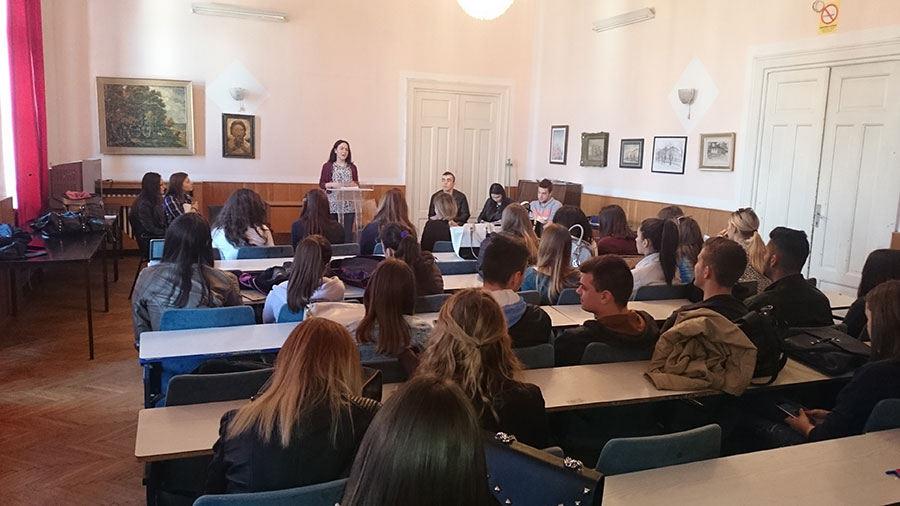The first in the series of eight debates planned within the European Debate School was held in Smederevska Palanka where students showcased their debating skills discussing the language as an element of identity.
On the affirmative side were Valentina Danilovic from Semederevska Palanka, Dunja Babic from Velika Plana and Kristina Vladisavljevic from Petrovac na Mlavi, whereas their opponents on the negative side included Dusan Cvorovic from Belgrade, Bojan Simic from Obrenovac and Ivana Talijan from Smederevska Palanka. They exchanged arguments at the congress hall of the Smederevska Palanka High School on the topic of “This house believes that European identity can exist without a common language”.
Their performance was assessed by the jury comprised of two civic education teachers, Danijela Nikolic and Sanja Spasojevic, and a sociology teacher Milica Djuric.
EUROPEAN IDENTITY ALREADY EXISTS
“What does the concept of European identity mean to us? When we say identity we believe that people should feel greater empathy and a sense of unity. Floods that hit Serbia couple of years ago provide an example of this argument: people who did not speak our language have allocated substantial funding to repair the damage they did not cause. Another example is the migrant crisis: if Serbia as a transit country does better, the migrants themselves will do better,” said the members of the affirmative team.
They said that Europeans already had much in common, e.g. when it comes to literature and art, regardless of the fact they all spoke different languages. The three-member team said that “despite the language being main form of identity, it should not be considered a barrier to understanding among people living on the same continent.”
Their last argument was that “European identity means showing cultural solidarity and having respect for languages other than our mother tongue” and added that “the EU advocates multilingualism.”
WE NEED A COMMON LANGUAGE
The team on the negative side based their case on the idea of introducing a single language, such as Esperanto which would be a “supranational language”, as a guarantor of the development of European identity.
“Esperanto is a neutral language which is made up of all languages and can be easily learned by everyone. Why not English? On the one hand, many EU citizens refuse to speak English, whereas on the other, there are languages whose linguistic characteristics make it hard for their speakers to learn English. Esperanto is neutral and combines the syntax of all languages and we argue that Esperanto would be much easier for everyone to learn than English,” said the members of the negative team.
To further expand on their arguments, they pointed to surveys which showed that the introduction of Euro as a single currency led to a greater sense of connection, adding that a common language would contribute to an even greater sense of unity.
“We don’t want to leave any language behind, all we want is to create a language that would be understood by everyone in Europe,” they said.
On behalf of the jury, the decision on the winner was announced by Sanja Spasojevic. She thanked everyone for having a mature conversation and their desire to develop critical thinking and declared the opposition team the winner.
“The negative side had a more difficult task to prove that a new, common language would bring a greater sense of unity. Even though they were charged with a more difficult task, they convinced the jury that a common language could lead to the development of supranational identity and a greater sense of unity,” the teacher said.




